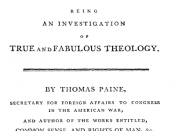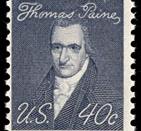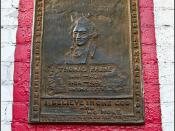Nature's Reasoning
" The simple voice of nature and of reason will say, it is right."(76) Thomas Paine passionately argued for what is right and logical in maintaining a working and equal society. Realizing the evil and non-constructive affects of a monarchial government, Paine derived his beliefs and opinions from the simplicity of nature.
In mid-June of 1775 the Revolution had reached its bloodiest and pivotal part. The moral of the American militiamen was optimistic for they showed Great Britain that they had the potential to do considerable damage to the British army. However, the American's revived optimism was shattered due to the veto of the Olive Branch Petition. By late 1775 the grip of King George tightened by condemning the Americans, labeling them as rebels, traitors, and enemies. Someone needed to speak up and Thomas Paine boldly brought forth common sense both literally and figuratively in early 1776.
After selling 150,000 copies in a few weeks, the American people realized the errors of the British constitution and the idiotic idea of a monarchy.
In Pain's opinion, the form of government should correlate with principles in nature. For example, Pain articulates," that the more simple any thing is, the less liable it is to be disordered, and the easier repaired when disordered."(76) Great Britain boasted how great their constitution worked, but it lacked simplicity and order. Paine claimed," England's constitution was so exceedingly complex, that the nation may suffer for years together without being able to discover in which part the fault lies."(77) Seemingly, Britain at this point was attempting to find the their fault that ran down the east coast of the new land. Paine made clear, the fault in Britain's constitution by identifying and describing it as," the base remains of two ancient tyrannies, compounded with some...


